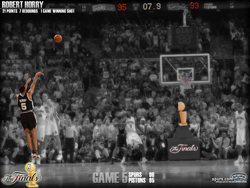Apologies if this has appeared elsewhere on the board: Elindholm is not alone!
sports nut
Sideshow Bob
Is Robert Horry the NBA's best clutch shooter or its best con man?
By Felix Gillette
Posted Thursday, June 16, 2005, at 2:13 PM PT
In Tuesday's Game 3 of the NBA Finals, San Antonio and Detroit are tied with about a minute left in the third quarter. The Spurs' Robert Horry launches a high-arching three-pointer from the top of the key. Nothing but glass. Forty-five seconds later, Horry drives in for a layup—rejected. When the Pistons run out on a fast break, Horry tries to block Richard Hamilton's shot from behind—goaltending.
In less than a minute, Horry's burst of bad play has helped the Pistons lock up a victory. But don't tell that to the announcers. "That's a guy," says ABC's Hubie Brown, "who is not giving up on anything."
This year's playoffs have followed an all-too-familiar script. Robert Horry throws up a bunch of bricks. Robert Horry gets celebrated as "Big Shot Bob," legendary sharpshooter and five-time NBA champion. In both 2003 and 2004, Horry's missed three-pointers helped eliminate his teams from the playoffs. Yet during this year's finals, there's a commercial showing then-Laker Robert Horry hitting a three from the corner against the 76ers back in 2001. "The Finals," says a voice-over, "where legends are born." In Horry's case, it's more like, "The Finals, where legends are nurtured, coddled, and defended against reality."
Robert Horry's career has been built on a great, underappreciated basketball truth: Big shots are only big shots if you make them. Unlike a missed field goal or a botched ground ball, a missed three-pointer is imminently forgettable. Even the best long-range shooters miss most of the time. Every NBA game has dozens and dozens of misfires, all of which look more or less the same. One more miss, no matter how important the context, tends to get lost in the clutter. If you're a role player, that goes double—nobody expected you to make the shot anyway.
Horry's true genius isn't his clutch shooting. It's his understanding of roundball amnesia. After sinking a buzzer-beater against Sacramento in the 2002 playoffs, Horry explained his philosophy. "If I hit it we win, if I miss y'all are going to blame the stars for losing the game anyway," he told the Washington Post's Michael Wilbon. "There's no pressure on me." Horry has none of the guts and gets all of the glory. In the 2003 playoffs, Horry went 2-for-38 from behind the arc—and everybody blamed Shaq and Kobe for the Lakers' downfall. After this year's Game 3 drubbing, Horry got off again—it was Manu Ginobili's and Tim Duncan's fault.
The Big Shot Bob persona is so overwhelming that it blocks out more than missed shots. Remember when Horry took a swing at Utah's Jeff Hornacek in 1997? What a clutch punch! Or when he threw a towel in the face of his coach, Danny Ainge, that same year? Dagger! How about when he got fined for shoving a cameraman in 2003? Now that's killer instinct!
After Game 2 of this year's finals, in which Horry scored 12 points on 4-for-10 shooting, ESPN.com's Bill Simmons declared Horry "one of the more important team players of the last 35 years," and possibly even deserving of a spot in the Hall of Fame. Horry's reputation as a great team player is a bit of a mix-up. It's more accurate to say he's been the teammate of great players: Hakeem Olajuwon in Houston, Shaquille O'Neal in Los Angeles, and Tim Duncan in San Antonio. Horry has made his career coasting on other player's coattails. He's 6-feet-10, yet he lets his teammates scrap in the paint for offensive rebounds while he hovers vulturelike at the three-point line. On offense, he's incapable of creating an open shot for himself. Instead, he stands around waiting for the defense to double-team his superstar teammate, hoping for an open look.
Horry isn't even the best forward from the University of Alabama in this year's finals. Antonio McDyess' career averages (15.7 points, .494 shooting percentage, 8.5 rebounds) dwarf Horry's feeble stat line (7.5 points per game, .431 shooting percentage, 5.0 rebounds). Yet all the glory goes to Horry.
During the first half of Game 3, Horry became the all-time leader in three-pointers made during the NBA Finals, passing Michael Jordan. Only Reggie Miller has made more playoff three-pointers than Horry. What a clutch shooter! Better than Jordan! Never mind that Horry has made only 227 of 634 of his playoff threes—a mediocre .358 shooting percentage. After all, who's going to remember any of those 407 misses?
Felix Gillette is a writer in Austin, Texas.


